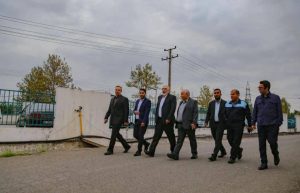
Smart Hospitals, strategic imperative to transform Iran’s healthcare sector
Barekat Health & Pharmaceutical Group: The integration of artificial intelligence (AI) into Iran’s healthcare system is not merely an enhancement in service efficiency and quality but also a model for other nations to emulate.
Smart hospitals, as the epitome of digital transformation in healthcare, are emerging as essential players in revolutionizing medical services in Iran. Leveraging advanced technologies like AI, the Internet of Things (IoT), and big data, these hospitals promise to enhance service delivery, optimize resource management, and reduce operational costs.
This essay delves into the infrastructure, challenges, opportunities, and critical technologies involved in establishing smart hospitals in Iran.
AI in Revolutionizing Healthcare
Modern technologies, particularly AI, are recognized globally as pivotal tools in transforming healthcare systems. In Iran, healthcare facilities are harnessing these innovations to improve service quality, streamline processes, and manage costs effectively.
AI’s unparalleled ability to analyze complex data, detect patterns, and make predictive decisions empowers medical practitioners and healthcare administrators to make informed decisions and optimize treatment protocols.
Smart hospitals exemplify this transformation, as they not only excel in disease diagnosis and management but also significantly mitigate financial burdens on the healthcare system. This dual benefit—enhancing patient care while controlling costs—underscores the indispensable role of AI-driven healthcare facilities.
Current Infrastructure Supporting Smart Hospitals
Iran has made notable strides in establishing the foundational infrastructure necessary for smart hospitals. Key elements include:
- High-Speed Internet: The development of fiber optic networks and mobile internet (4G and 5G) facilitates rapid data transmission.
- Hospital Information Systems (HIS): Many hospitals have adopted HIS to manage patient data and streamline operations.
- Electronic Health Records (EHR): Nationwide implementation of EHR systems serves as a cornerstone for smart healthcare integration.
- Tech Startups: A growing ecosystem of health-tech startups is innovating locally tailored solutions for hospital digitization.

Challenges in Developing Smart Hospitals
Despite advancements, several obstacles hinder the widespread adoption of smart hospitals in Iran:
- Inadequate IT Infrastructure: Limited access to up-to-date technology in certain hospitals due to financial or administrative constraints.
- Workforce Training: A lack of familiarity with emerging technologies among medical and administrative staff.
- Data Security and Legal Barriers: Ensuring patient privacy and securing medical data necessitate robust regulatory frameworks.
- High Implementation Costs: Advanced technologies like AI and IoT require substantial investments, often straining budgets.
Opportunities for Growth
While challenges persist, numerous opportunities could accelerate the adoption of smart hospitals in Iran:
- International Collaborations: Partnerships with global tech firms can facilitate access to cutting-edge technologies and expertise.
- Telemedicine Expansion: Smart hospitals can leverage remote healthcare services to address medical needs in underserved areas.
- Government Support: Strategic prioritization of hospital digitization by policymakers offers significant momentum for progress.
- Leveraging Domestic Talent: Collaborations with local tech startups can produce cost-effective, scalable solutions tailored to Iran’s healthcare needs.
Core Technologies in Smart Hospitals
1.Artificial Intelligence (AI): AI plays a pivotal role in diagnostics, predictive analytics, and personalized medicine. Algorithms analyze medical imaging, forecast treatment outcomes, and streamline hospital workflows. For instance:
– AI-driven systems can detect tumors in MRI scans with remarkable precision.
– Machine learning models optimize resource allocation, reducing patient wait times.
2. Internet of Things (IoT):
IoT enables seamless communication between medical devices, healthcare staff, and patients. Wearable sensors monitor vital signs in real-time and relay data to healthcare professionals for prompt interventions.
3. Big Data Analytics:
Massive data sets are processed to identify disease trends, predict outbreaks, and formulate effective treatment strategies.
4. Robotics and Automation:
Robots assist in surgeries, drug dispensing, and patient care, enhancing precision and efficiency while reducing human error.
5. Augmented and Virtual Reality (AR/VR):
AR/VR technologies revolutionize medical education and surgical planning, offering immersive training environments and precise procedural guidance.
Global Benchmarks
Several countries serve as benchmarks for smart hospital implementation:
– Cleveland Clinic (USA): Utilizes robotic systems for complex surgical procedures.
– Singapore Hospitals: Leverage IoT for efficient asset management.
– European Institutions: Apply AI to personalize treatment plans and improve diagnostics.
Iran’s adoption of similar practices could position its healthcare system as a regional leader.
Strategic Recommendations
To overcome challenges and harness opportunities, Iran must adopt a multi-pronged approach:
- Government Investments: Allocate special budgets and tax incentives to foster technology adoption.
- Capacity Building: Train healthcare professionals and hospital administrators in emerging technologies.
- International Partnerships: Collaborate with global tech firms and academic institutions to gain access to expertise.
- Infrastructure Development: Expand reliable, high-speed internet and establish secure IT networks.
- Policy Reforms: Develop comprehensive regulations to protect patient data and encourage innovation.
- Public Awareness Campaigns:* Educate stakeholders about the benefits of smart hospitals to foster acceptance.
Conclusion
Smart hospitals represent a transformative opportunity for Iran’s healthcare system, promising improved service delivery, reduced operational costs, and enhanced patient satisfaction. Despite financial and infrastructural challenges, Iran is well-positioned to leverage its burgeoning tech sector and government support to establish a leading smart healthcare ecosystem. Through strategic investments, international collaborations, and robust policy frameworks, Iran can not only meet its healthcare demands but also emerge as a pioneer in the regional smart hospital landscape.
-
Afghanistan’s Ministry of Public Health Delegation Meets Barkat Pharmaceutical Group Executives

-
Voice of Life in World of News — Redefining Health Journalism in the Information Age

-
Senior Health Officials & Barkat GD Visit Sobhan Oncology

-
Barkat Group specialized meeting

-
Safa Appointed as Barekat General Director

-
Barekat Health & Pharmaceutical Group at the 10th Iran Pharma Exhibition

-
Ali Safa visits Sobhan Oncology & Sobhan Darou

-
Pirsalehi & Safa visit Saman Daroo 8 Knowledge-based Company

